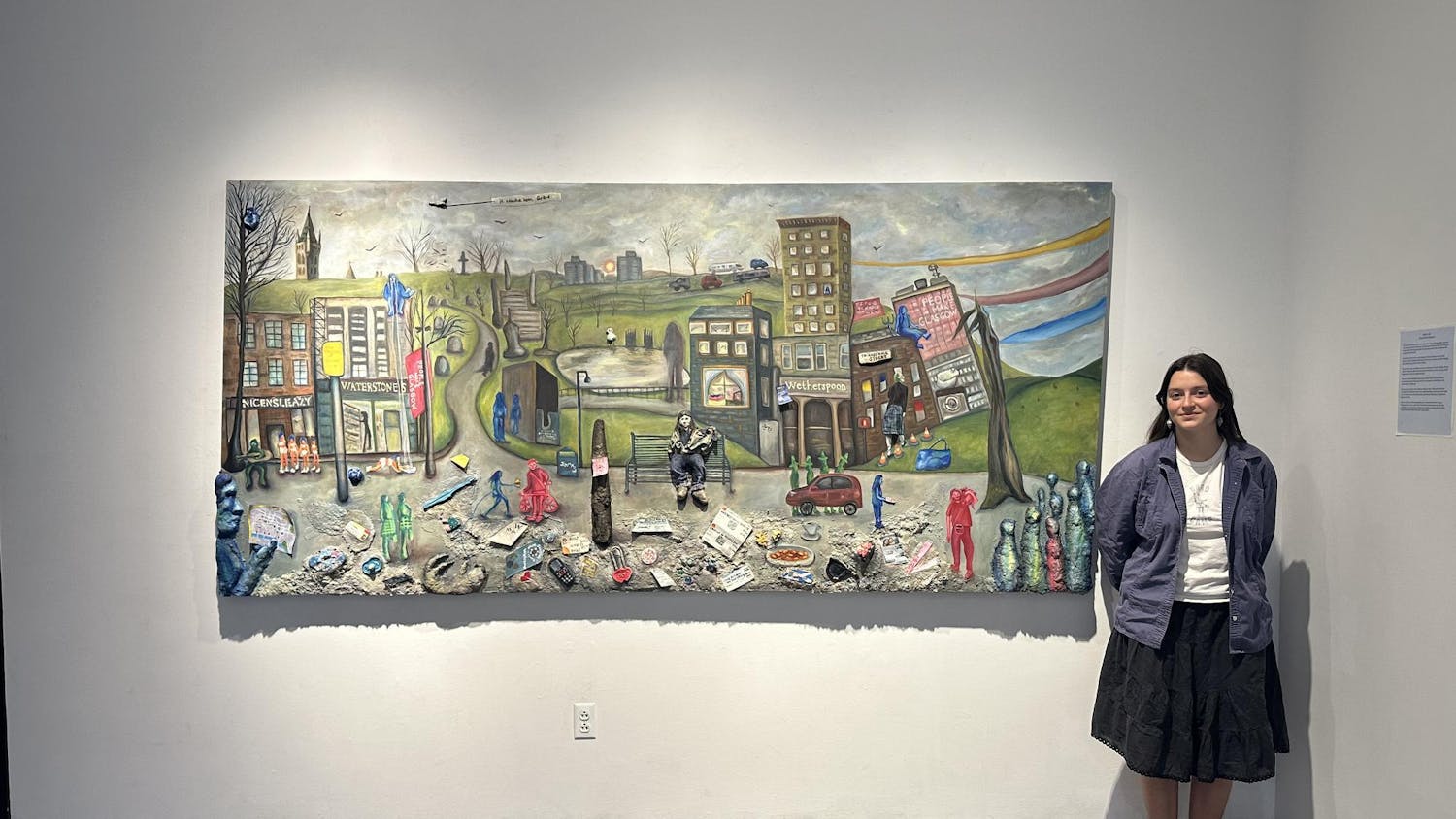Last year Marissa Bergman ’14, Emily Kassie ’14 and Jesse Weil ’16 found themselves discussing a mutual interest: “Les Miserables.” As the conversation wandered from the recent star-studded movie — they thought it was overdone — to the possibilities of ever seeing it on Brown’s main stage — slim to none — the trio asked a question: “Why don’t we do it?”
More than one year and just under $5,000 later, a Group Independent Study Project entitled “Les Miserables: In Text and Production” is bringing the plan into fruition in the Perry and Marty Granoff Center for the Creative Arts as “Les Miserables: In Concert” takes the stage for four nights this week.
“We thought about what way we could do it that was actually plausible,” Weil said. “We realized that because of the elaborate nature of the set and the costumes and how grandiose it is as a production, … it was never going to be done as a traditional” show at Brown.
After three eager friends seconded their interest in forming a GISP, the six students set out contemplating both content and, crucially, plausibility.
“We wanted to get back to the roots of ‘Les Mis’ the production, which is really in the music,” Kassie said. “Beyond that we wanted to see how the Victor Hugo text translated into production — what was left out, what was kept in.”
The group landed on a dual concert production and study of the novel. “We decided it would be not only an interesting theatrical endeavor but also an academic one to explore the way in which it was adapted and put on our own version,” Kassie added.
Visiting Assistant Professor of Theater Arts and Performance Studies Marcus Gardley agreed to serve as faculty advisor for the GISP, which was approved last November as a spring course. “He gave us some good advice to really keep the GISP and production as separate as possible, to really focus on the GISP being an academic pursuit,” said Michael Gale ’14, a member of the GISP.
The course included two-and-a-half hours of class time plus an hour-long meeting with Gardley each week. Work included reading the book, studying movie and musical adaptations and “watching just about every version of ‘Les Mis’ on YouTube,” so that the group could further “accomplish what we thought the essence of the book was” in its own adaptation, Weil said.
But the performance aspect took up the most time. Five GISP members would act, Bergman would direct and all six would produce, they decided. Work on the show started in the fall, with auditions planned for November even before the GISP application passed. “We said no matter what, we’re going to do a production,” Kassie said.
As both the show and the course developed, the study of Hugo’s text and more recent textual adaptations — such as movies and performances — shaped the direction of the performance more and more.
The production focuses on the music, using “stylized blocking” instead of extensive dramatic acting, Kassie said. The stage lies barren of set, instead featuring five clusters of microphones at staggered increments, with the cast sitting in a semi-circle of chairs directly behind. When an actor comes to a microphone — or many actors in an ensemble piece — the simplicity is intended to bring out the dramatic nature of the text and the lyrics themselves, Kassie said.
Creative art and quotes from Hugo’s novel project on the back wall throughout the performance. Famous lines such as “to love another person is to see the face of God,” “it is nothing to die; it is frightful not to live” and “not being heard is no reason for silence” serve as a backdrop highlighting Hugo’s broader ideas, while the music “sets the mood of each character” and conveys the story, Kassie said.
This allows the audience “to connect with it as is,” Weil said. “A lot of the quotes are very emotional, so we don’t have to do anything.”
Some actors felt that the emphasis on singing over blocking, or ensemble acting, required a separate approach than normally taken for a production of “Les Miserables.”
“The way you engage with the other people on stage is very different,” said Weil, who plays Marius in the show.
Kassie, who plays Eponine, felt a further ability “to focus on the character and what they’re singing or saying” than she would have if the large-set pieces and action scenes had been incorporated, she said.
Characters interact on the stage, but typically in a brief and understated way, with facial expressions conveying the majority of the emotions.
“I think it has had enormous benefits in regard to the music, … which I think is the most crucial thing when you’re talking about ‘Les Mis,’” wrote Joe Van Wye ’15, who plays Jean Valjean, in an email to The Herald.
Besides the source for the projected quotes, Hugo’s text also served as a large source of some actors’ character development.
“As much as I love the Broadway, West End production of ‘Les Mis,’ … I would say the text more than anything influenced my choices as Eponine,” Kassie said. “There’s a selflessness and a loyalty to Eponine that is really brought out in the text,” a contrast to the usual production in which Eponine’s feelings for Marius are blatantly obvious, she said. A line from the novel unused in the musical — “You know, Monsieur Marius, I think I might have loved you a little bit,” whispered as Eponine dies in Marius’s arms — “crystallized her experience for me and brought a lot more depth to the character,” Kassie said.
Gale, cast as Javert, expressed similar experiences. “I think one of my biggest issues with the musical is that most of the characters are portrayed pretty flat. They’re not very dynamic.” For him, it was a line in the musical — “You know nothing of Javert. I was born inside a jail. I was born with scum like you. I am from the gutter too.” — that lacked context until he read Hugo’s book. “With the information I learned studying the book, … I was able to see that Javert’s entire persona is just a construct, this inferiority complex. It gave me a lot to work with that I would’ve missed,” Gale said.
Van Wye is not part of the GISP and has never made it through the “beautiful slog” that is Hugo’s work, but working with Bergman allowed him to discover deeper character motivation in bringing out a Valjean who isn’t perfect, he wrote.
“I think for the people in the GISP it’s been very different, but for the rest of the cast it has just felt like a normal show,” he wrote.
Music director Alex Sogo ’15 agreed that the production being contained within a GISP did not change much, with the exception of the six producers having more control over the show, he said.
Sogo even considered doing an independent production of Les Miserables with a friend last year, before realizing it would be too massive an undertaking for two people, he said.
Ultimately the GISP — an unconventional method — proved the ideal venue for the undertaking, members said. “Student shows at Brown are really difficult to get past theater boards and really difficult to put on,” Kassie said.

ADVERTISEMENT




